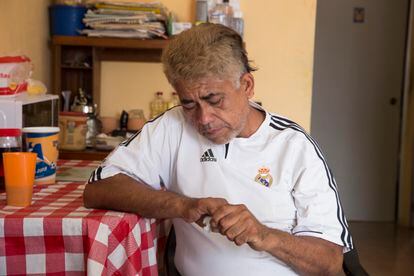This is the web version of Americanas, the newsletter of EL PAÍS America that deals with news and ideas with a gender perspective.
To receive it every Sunday you can subscribe
at this link
.
I've been dreaming about wanted posters for 20 days: smiles, eyebrows, bits of ears of women I don't know, I've never seen, I don't know the names, the age, the places where they came from.
Where are they?
They come back every night.
And they don't go away.
*
In recent weeks, Nuevo León has become the epicenter of what the media has called a crisis of missing persons.
While we were covering the situation in the industrial bastion of Mexico, one of the most powerful states in the country, led by a governor addicted to Instagram, cries were coming from Coahuila, Oaxaca or the ever-feminicidal State of Mexico.
“Hey, women are also disappearing here, hey, they are also being killed, look at them, look at them, they are the ones that are no longer here, look at them.”
And you look and feel the tweak and maybe retweet that sister's post, that friend, that stranger desperately asking for help.
And the knot gets tangled up because you, who are looking at them and they are hurting you, are not doing anything else.
Exit Twitter.
Then they come back.
*
The case of María Fernanda Contreras was the first picket that cracked the ice cap that protected society from its deaths: in Mexico seven women disappear every day, 11 are murdered.
These are figures that are very difficult to digest while life goes on and the concerts continue and the kindness of someone who gives you some tacos and the books you like and your friends around a table having a beer.
In the face of terror and tragedies, only anesthesia has remained.
However, there are cases that break everything.
María Fernanda, who was 27 years old and worked in finance but wanted to be a writer, disappeared on April 3 in Apodaca, in the Monterrey metropolitan area.
Her parents took just six hours between her last WhatsApp and the complaint in the Prosecutor's Office – you don't have to wait a minimum of hours to file a disappearance report.
They found the 1.2 kilometer area where her cell phone was turned off.
They notified the police;
it was no agent.
Her father spent hours on her account trying to locate any trace, like a bloodhound tracking behind garages and behind windows.
He didn't find her.
When the Prosecutor's Office arrived three days later, María Fernanda was dead.
First cramp.
The day the authorities announced that error-plagued discovery, the following face emerged: Debanhi Escobar, 18, disappeared in Escobedo,
a few kilometers from María Fernanda.
Second download.
*
We met Debanhi Escobar's parents at kilometer 15.5 of the Monterrey highway in front of the Nueva Castilla motel.
So, the young woman had been missing for six days and for her family it was already too much.
They were desperate: since five in the morning of April 9, no one had heard from the young woman.
Her mother, Dolores Bazaldúa, repeated like a mantra: "It is today, it is today, my mother's heart feels it, it is today."
Mario Escobar, her father, justified the attention that his case had begun to receive: “We are not powerful people.
We are teachers.
We don't lack anything, look, I have four jeans and a few pairs of shoes;
because everything we have had has always been for our daughter.”
That day everything around the motel had already been combed - the hotel included - so the search party went 60 kilometers away to the well of a lost community.
The irrational trust of the family, the words of Mhoni Vidente, a supposed fortune teller, who claimed that the girl was in a place with water, and the armor of a neighbor, took us there.
The small woman was sure, she had felt it, there was no doubt, Debanhi was in Lumbreras de Tlaxcala.
They searched for her with dogs, drones and fear and they did not find her.
The day a new search began at the Nueva Castilla motel, the day the body was found in an abandoned cistern, the day hope ended, Mario Escobar screamed.
After the disappearance and death, the burial, the autopsy of Debanhi Escobar;
then the crying, the screaming, the silence, the questions about Debanhi Escobar.
*
In a poor house with colored walls, located on a street where Google Maps does not even reach, Gerardo Martínez already receives us crying.
He has put two small signs of his daughter Yolanda Martínez Cadena, who disappeared on March 31 in San Nicolás de los Garza, on a wall outside and another with candles inside.
In an hour he tells us: no one is looking for his daughter, no tracking has been done, he calls her every day early in the morning, he also writes to her: where are you? The birthday of her granddaughter Fer, Yolanda's three-year-old daughter, hasn't thrown the party yet, because maybe it's still coming, right?
Gerardo Martinez, father of Yolanda Martinez Cadena, disappeared on March 31, when she went out to look for work in the municipality of San Nicolas. Juárez, Nuevo León, Mexico, on April 24, 2022. JULIO CÉSAR AGUILAR
Gerardo, reclining on a chair;
Gerardo who has
tics
because he doesn't sleep, because he doesn't eat and just waits.
He says that when he handed out his daughter's flyers on the streets alone and that 200 special agents were looking for Debanhi, he thought that the latter was good news: perhaps the two young women were together and when they found one, they all appeared, right? ?
Gerardo says goodbye and thanks for the time and sorry for crying, and when he leaves that humble house there is hardly anything left.
In silence, we arrived at the nearest Oxxo and there it was at the door.
It was someone else, someone else, also young, also in Monterrey, also smiling: they are looking for Celeste Tranquilino, 16, who disappeared in Juárez.
Gone, gone, gone.
So every night, until they come back.
And, of course, they don't go away anymore.
Our recommendations of the week
Some suggestions:
🎶 A singer: Petrona Martinez.
By Almudena Barragan
'Ancestras', the legacy of women of African descent in America
.
I recently came across the music of Petrona Martínez, one of the great voices of bullerengue in Colombia, a dance sung and accompanied by percussion characteristic of the Afro-descendant population of the Urabá region and the Caribbean coast in the departments of Córdoba and Bolivar.
The voice of Martínez, 83 years old, is a living legend of the folklore of his country, invisible and discriminated against for decades.
His latest work, 'Ancestras', earned him a Latin Grammy in 2021 as the best folk album of the year.
On the album, Martínez joins her torn lament to the voice of other Afro artists from Brazil, Honduras, the United States, Colombia, Cuba, the Dominican Republic, Panama and Peru, among others, to pay homage to the oral tradition that her mothers and grandmothers they teach them.
A song of love and resistance.
Word sung and told that tells the story of those who fled slavery and built the first free cities, such as Palenque, near Cartagena.
Do not miss this beautiful work in which Susana Vaca, Nidia Gongora, Eryen Korath, Buenaventura, Angelique Kidjo, Aymee Nuviola, Enerolisa Nuñez, Yomira John, Xenia França and Neta also sing.
Afro-feminist writers have also participated in the project, contributing their critical thoughts on Petrona and bullerengue from different perspectives.
Here's a taste of the lyrics:
“When I came to Palenquito I saw life in a hole
I dedicated myself with my children to get sand from the stream
Hey my chale, life is worth it
Take the shovel in hand, let's get the sand out
Cesar Jiménez already the growing one lowered
We are going to take out the sand to win over rice (…)
In the Palenquito neighborhood, we are all companions
And we sandboxes live from the stream”
And here a little bit of his music.
You can listen to 'Ancestras' on all platforms.
📨 A newsletter
Our colleagues from EL PAÍS Fem, the section of the newspaper dedicated to feminism and gender, launch a feminist newsletter.
The newsletter will be coordinated from Madrid by the gender correspondent, Isabel Valdés, who promises that it will be "funny or sad, but it will always be what we talk about on our WhatsApp or in our bars, because those are the things that matter to us at the end of the day”. From Americanas
,
we wish you all the success in the world and we encourage our readers to register to also learn about the gender and equality stories that concern the other side of the Atlantic
.
Thank you very much for joining us and until next Sunday!
(If you have been sent this newsletter and want to subscribe to receive it in your email, you can do so here).


/cloudfront-eu-central-1.images.arcpublishing.com/prisa/EWJ6D24N4FAMNMM5L7QDF7NQFM.jpg)






